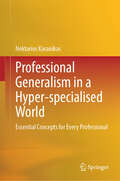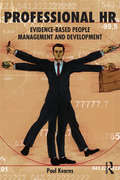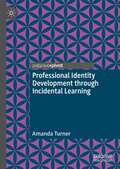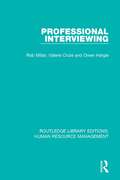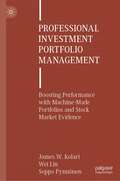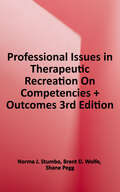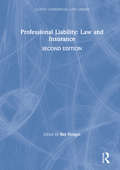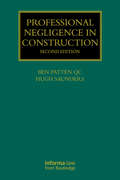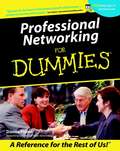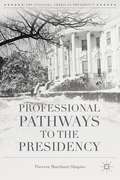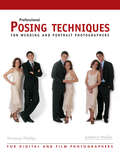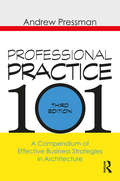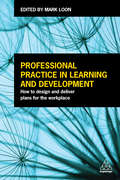- Table View
- List View
Professional Generalism in a Hyper-specialised World: Essential Concepts for Every Professional
by Nektarios KaranikasThis book challenges the notion that extreme professional expertise is the only path to success, advocating instead for the concept of 'professional generalism' as a complementary approach. It brings together ideas from various disciplines, offering insights relevant to all professionals, regardless of specialisation. The chapters of the book explore concepts and frameworks that are not typically discussed together in a single work and challenge the reader to test and contextualise them. The book aims to inspire professionals to explore principles beyond their usual scope and to recognise opportunities to integrate concepts from other disciplines into their practice. It encourages readers to consider how different approaches and perspectives can intersect and complement each other, breaking down professional silos and fostering a more interconnected way of thinking. Rather than promoting simplistic or middle-ground solutions, the book emphasises the value of considering diverse perspectives and approaches, recognising that different contexts may require different paradigms. It encourages readers to embrace complexity and diversity, fostering a holistic and nuanced perspective essential for navigating today's interconnected professional landscapes.
Professional HR: Evidence- Based People Management and Development
by Paul KearnsA new breed of HR Professional is needed who can offer the sort of effective people management that can change the way organizations work. They will first have to resolve the legacy left by an absence of professionalism in people management amongst both operational managers and the HR departments that serve them. Much of the problems that currently undermine capitalism and governance today can be traced back directly to insufficient attention being paid to the professional management of human capital. This text offers an objective scale to gauge levels of professionalism that can be applied to management in any sector. Paul Kearns has also developed a clear 10-step guide for anyone looking to develop their HR professionalism in a practical way. With an insightful Foreword by Professor Jeffrey Pfeffer and with these tools, readers will be encouraged to move away from the old world ineffectiveness of people management by looking towards a New Norm and the huge potential it offers for value and wealth. Suitable for managers and students studying HR, Professional HR provides the answer for what could be the next iteration of the capitalist system, with professional, evidence-based people management at its heart.
Professional Identity Development through Incidental Learning
by Amanda TurnerSince the early 1990s there has been a persistent drive towards professionalising the education sector, with a particular focus on those responsible for teaching the post-fourteen age group. This shift towards recognition of the sector in terms of the professionals who teach within it has led to constant, repetitive revision of teaching standards, the regulation and subsequent de-regulation of the teaching qualifications and the introduction of professional bodies. This book aims to explore the way that professional identity develops for trainee teachers, in the FE and Skills sector, with a particular emphasis on the role that incidental learning has in this development. The author argues for a more holistic approach to the development of professionalism through these informal learning experiences, as opposed to a criteria based approach.
Professional Interviewing (Routledge Library Editions: Human Resource Management #28)
by Owen Hargie Rob Millar Valerie CruteThis book, first published in 1992, presents a detailed, informed and informative account of research, theory and practice in interviewing. As a single source for practitioners, it focuses on the professional practice of interviewing as a strategy for achieving specific objectives. As well as providing reviews of recent research in interviewing, it includes practical examples of interviewing in many different contexts. The authors, all of whom have wide experience of interviewing, draw on a wealth of information and insight acquired during their work. They examine the definitions and purposes of interviewing and then describe the main settings within which it takes place - counselling, selection, research, medical and appraisal. Taking a social interactional model of interviewing, they discuss the main components of the activity: person perception; interviewer goals; interview structures and stages; effective interviewing skills; and the interviewee's perspective on the interview process. Examples are used to illustrate particular issues and to highlight their relevance to practice. The authors also consider important ethical and professional problems which may crucially affect the practice of interviewing. This book should be of interest to professionals and students in psychology, health, counselling, human resource management and business.
Professional Investment Portfolio Management: Boosting Performance with Machine-Made Portfolios and Stock Market Evidence
by James W. Kolari Wei Liu Seppo PynnönenProfessional investment portfolio management is increasingly utilizing sophisticated statistical and computer techniques to better control risks and improve performance. This book provides new quantitative tools and technology for securities professionals to help boost the performance of their investment portfolios offered to clients. Unlike other books in this area, the authors utilize revolutionary asset pricing methods and models to analyze data for U.S. stocks and show how to apply them to the problem of creating highly diversified portfolios that are efficient in terms of returns per unit risk.
Professional Issues in Therapeutic Recreation: On Competencies and Outcomes
by Norma J. Stumbo Brent D. Wolfe Shane PeggThe latest edition of Professional Issues in Therapeutic Recreation On Competence and Outcomes recognizes that the profession must continue to challenge the status quo and one another. Issues and ideas are not stagnant; they are forever changing, and the various sections and chapters of this edition will challenge the reader to conceptualize ideas from new perspectives and in a new light. Readers are encouraged to wrestle with the ideas presented. Do not simply read them and file the information away. Interact with the ideas. Discuss the ideas. Argue about the ideas. Whatever you do, do not simply disregard an idea because it represents a viewpoint or perspective that is different from your personal philosophy related to the profession. We challenge all readers to be drawn into the variety of topics, concepts, and perspectives presented in this volume so each can continue to personally grow and enable the profession to continue to grow. Like the first two editions, this effort has four major sections: Introduction, Education, Practice, and Research. It is clear that these divisions are largely arbitrary, as every practice issue affects every research issue, every education issue affects every practice issue, and on and on. However, books require an organizational layout, and these divisions appear to make sense. Each section begins with a Keynote chapter aimed at setting the stage for that particular section. Each section also ends with a Perspective chapter, largely an opinion or viewpoint piece to encourage readers to continue discussion on related issues.
Professional Learning as Relational Practice
by Jenny ReevesGiven the emphasis on transforming professional work through the adoption of enquiry-based and trans-disciplinary approaches to service development, there is an urgent need for those involved in professional education to develop a robust understanding of how changes in practice occur. A more inclusive approach to the analysis of the processes involved across the varied and interrelated contexts in which they occur is thus very timely. In this book, Jenny Reeves sets out to explore the gap between the experience of professional learning as an interactive, dynamic and socially contextualised process, and descriptions that are often individualistic, overly linear and largely context-free. She makes the claim that this disjuncture is the outcome of modes of enquiry that concentrate on limited selections of the available data. Adopting a relational approach to describing practice-based professional development, including graphical means for exploring the spaces produced by the activity, provides a very different picture. It creates a basis for representing the complex movements, relationships and interactions between people and things that occur during professional learning. It also provides a productive approach to describing the exchange and creation of professional knowledge across different contexts over time. By building a picture of the ephemeral spaces and connections that educating activities produce, mapping relational space allows those engaged in professional education to think rather differently about how professional learning and changes in knowledge and practice may be understood, supported and developed.
Professional Learning from Classroom-Based Inquiries
by Jyoti Rookshana Jhagroo Patricia Martha StringerThis book provides authentic practice-based inquiries by pre-service teachers. Their reflective narratives showcase their individual inquiries as they navigated their self-chosen professional learning journeys through the teaching as inquiry framework. The narratives advance what it means to be a reflective practitioner in practice and highlight necessary dispositional skill sets to attain valuable professional learning through inquiry. Through an inquiry stance, pre-service teachers are liberated from being knowledge consumers to local knowledge producers relevant to their practice. The dissonance this shift creates, negates the ‘comfortable doing’ of teaching to make the act of teaching authentic, relevant, and powerful.
Professional Liability: Law and Insurance
by Ray Hodgin, LL.M.Professional Liability: Law and Insurance 2nd Edition has been updated in line with changes in the law. With the increase in liability litigation and the growing sophistication of the law in this area, this edition provides an easy-to-read reference source offering a practical analysis of professional negligence.
Professional Management Consulting: A Guide for New and Emerging Consultants (Routledge-Solaris Applied Research in Business Management and Board Governance)
by Alan J. BlackmanAt a time when consulting has increasingly come under scrutiny by governments and communities, Professional Management Consulting: A Guide for New and Emerging Consultants redefines “management consulting” and reinforces what it means to be a professional. With a focus on the importance of ethical practice and continuous personal development for building reputation, this easy‑to‑read book sets a new benchmark for aspiring consultants.Based on sound research and supported by the author’s background in leadership, management consulting practice, research, business strategy, and academia over several decades, Blackman brings together a range of tried and tested theoretical models commonly used by successful consultants. Drawing on his own experiences as a director of the industry’s peak body, the International Council of Management Consulting Institutes, he provides a clear explanation on what a management consultant is and how and why clients use consultants to help them solve complex problems and manage change. With an emphasis on the importance of building and recognising relationships as a basis for problem‑solving and implementing change, this book is an essential contribution to the profession worldwide.This book is a vital resource for new and emerging professional consultants. It is suitable as an introductory text for business/commerce and engineering undergraduate students and a secondary reading for graduate students in engineering and management.
Professional Marketing & Selling Techniques for Digital Wedding Photographers
by Jeff Hawkins Kathleen HawkinsUpdated to include the latest digital camera models, imaging software, and current image proofing and sales techniques, this business guide teaches wedding photographers how to build a profitable business. From formulating a business plan to presenting final images to clients, the strategies presented help photographers avoid the pitfalls that ruin many wedding photography studios. Photographers learn how to define a target demographic#151;whether that be low-volume big-budget or high-volume low-budget clients#151;and market to those demographics in print, on the Internet, through networking, and at bridal shows. Customer service tips include how to interview clients to ensure a stress-free and enjoyable portrait experience, conduct presession consultations, and write a contract, as well as presentation techniques for wall-size images, coffee-table#150;style books, and guestbooks. The featured images and drawings include a gallery of the author's wedding photographs and samples of advertising, marketing, and promotional literature.
Professional Meeting Management: A Guide To Meetings, Conventions And Events
by Professional Convention Management Association StaffThe sixth edition of Professional Meeting Management is the newest edition of the longtime standard reference and textbook for the meetings industry and meetings education. This is the first student and meeting professionals textbook aligned with the new Certified Meeting Professional (CMP) International Standards, which will be used by the Convention Industry Council as a reference book for item writing for the CMP Certification Examination. It includes the most up-to-date information on current trends, strategic planning for meetings, budgeting and funding, marketing and promotion, technology, running and closing the meeting, and industry developments on the horizon.
Professional Mentoring for Early Childhood and Primary School Practice (Springer Texts in Education)
by Mary Moloney Jennifer Pope Ann DonnellanInformed by current theory and practice, this book adapts a practical approach to mentoring that is grounded in real life experiences. Written in an accessible style, it explores the key concepts, characteristics and considerations of mentoring and mentoring relationships in early childhood and primary education contexts. With a focus upon mentoring as it applies to practicum during initial teacher education, as well as teacher induction, different models and approaches to mentoring, including dyads, triads, peer mentoring, critical friends and communities of practice (CoP) are introduced and evaluated. Engaging with theory, practical scenarios, key learning and reflection points throughout, the book invites the reader to reflect on the mentoring process from different perspectives to build the critical skills required by mentors and mentees alike, to create or enhance a culture of mentoring within their organisation. Written from the perspective of both mentors and mentees, the book is a valuable resource for those in the Further and Higher education sectors, as well as early childhood and school-based mentors. It is relevant to experienced mentors, who may wish to affirm their existing approach to mentoring, or want to explore, discover and embrace new and improved ways of working with a mentee. This book is also essential reading for anyone interested in mentoring, providing a wealth of information, insights and effective strategies for those who may be thinking of undertaking a mentoring role.
Professional Negligence in Construction (Construction Practice Series)
by Ben Patten Hugh SaundersWhat is professional negligence? What are the obligations of construction professionals in contract and in tort? In what circumstances might the difference between the obligations be important? These questions are of crucial importance not only to construction lawyers but also to contractors, architects, quantity surveyors, engineers, project managers, and multi-disciplinary practitioners. With an emphasis on the practical aspects of professional negligence in the construction industry and written in a straightforward yet authoritative way, this book is ideal for lawyers and students of construction and law as well as construction professionals at all levels.
Professional Networking For Dummies (For Dummies Ser.)
by Donna FisherAre you putting your best foot forward in meetings? Are you connecting with the right people at functions? Throughout your life, you will find yourself in situations where professional networking will help you get to where you want to go. Whatever your strengths or weaknesses are, you can always improve your networking skills, and Professional Networking For Dummies can show you how. Whether you feel ineffective at connecting with others or just want to become a better networker than you are today, Professional Networking For Dummies can help you develop great people skills. Professional Networking For Dummies explores the essential techniques of networking to get you meeting and greeting in no time. It will help you get into the networking mindset and avoid such self-defeating traps as expecting immediate returns or turning off new potential colleagues. You’ll also discover how to overcome inhibitions, make small talk, and meet new contacts. Plus, you ’ll find special information on networking tools and technology, such as networking clubs, using voice and e-mail, Internet networking, and more. Through these pages you’ll find out how to: Maximize your relationships Expand your circle of influence through networking events Network in the corporate world, your community, and in your personal life Develop lifelong career-building habits Build and maintain your network Networking is a universal principle of giving and receiving—a lifestyle rather than a technique. Professional Networking for Dummies can help you build lasting, powerful relationships, both in and out of the office. From using business cards properly to networking your way into a new job, this friendly guide is your tick to personal and professional success.
Professional Occupations and Organizations (Elements in Organization Theory)
by Daniel Muzio Sundeep Aulakh Ian KirkpatrickIn this Element, we engage with fundamental questions concerning the future trajectory of professions as a distinct occupational category and of the formal organizations, which represent, employ or host professionals. We begin with a literature review that identifies a functionalist, power and institutionalist lens for the study of professional occupations and organizations. We then review a series of challenges which face the contemporary professions. Finally, we explore contemporary developments in the worlds of professions applying three units of analysis: macro (professional occupations and their associations), meso (professional organizations) and micro (professional workers).
Professional Pathways to the Presidency
by Theresa Marchant-ShapiroDuring presidential elections a quadrennial debate emerges, wherein candidates lay claim to qualification for the presidency based on their prior professional experiences. Usually this entails invoking the legacy of one of the great presidents, who followed the same trajectory to the White House. Missing from this debate is a systematic analysis of how the different job experiences prepared the population of all presidents for service. For each of the greats who followed a particular pathway to the presidency there is at least one failure who shared the pathway. This book takes both a quantitative and descriptive approach to evaluate all the presidents systematically in order to discuss how prior professional experiences influence presidential performances.
Professional Photography: The New Global Landscape Explained
by Grant ScottSince the 2006 photographic digital revolution, the world of professional photography has been on a rollercoaster of evolution. Not only has new camera technology transformed every aspect of the professional photographer’s workflow, but it has also changed business practices across the industry. This essential handbook uses a global approach to teach photographers how to thrive in a fast-changing and competitive international marketplace. Highlights include practical examples and detailed advice about: Being well-versed in creating both still and moving images. Designing and maintaining a well-structured website. The importance of engaging with social media. Exploring personal projects to find new clients. Managing print sales and exhibiting. Understanding budgeting and copyright in a digital world. The accompanying podcast interviews with some of today’s top professional photographers provide additional insider information to help photographers understand their place in both the commercial and creative worlds.
Professional Posing Techniques for Wedding and Portrait Photographers
by Norman PhillipsCombining two disciplines#151;posing and wedding portraiture#151;this professional resource helps photographers create flattering poses to build the best possible portraits and highest possible sales. Photographers are taught how to position the head, shoulders, torso, arms, hands, legs, and feet to correct figure flaws, make a client feel relaxed, and evoke a dynamic image that tells a story or defines a relationship. The challenges of shooting on location are addressed with tips for adjusting poses in any situation. A discussion of body language and how small adjustments can change an entire mood provides photographers with the ability to help their clients convey a variety of desired messages, whether elegant, sexy, or playful. Standing, seated, and floor poses are covered along with specific techniques for photographing brides, grooms, and wedding parties.
Professional Practice 101: A Compendium of Effective Business Strategies in Architecture
by Andrew PressmanProfessional practice courses often suffer from a boring reputation, but there’s nothing dull about this updated, cornerstone edition of Professional Practice 101, which renders accessible the art and science of contemporary architectural practice. With its unique focus on links between design thinking and practice, this third edition brings an inspiring and fresh perspective to the myriad issues involved in successful architectural practice. The process of providing architectural services in today’s constantly evolving practice environment must be just as creative, intellectually rigorous, and compelling as wrestling with design problems. In this new edition, packed with invaluable advice from leading experts, Andrew Pressman bridges the knowledge and experience gap between school and practice covering topics such as: Ethics, social responsibilities, and obligations to the environment Design firm types, culture, and leadership Financial, project, and time management Service and project delivery; leveraging emerging technologies Entrepreneurial business models and business development Legal issues, including AIA contract document analysis Collaboration and negotiating with clients and stakeholders Practice-based research Students and early-career professionals will discover the fundamentals they need to launch their careers as well as more sophisticated strategies that will allow them to thrive as their roles evolve and they assume increasing responsibilities. This engaging, comprehensive primer debunks the myth that recent architecture graduates have little or no guidance to prepare them for business. Professional Practice 101 is a learning tool that will readily deliver the knowledge and background for success in current architectural practice.
Professional Practice for Landscape Architects
by Rachel Tennant Nicola Garmory Clare WinschProfessional Practice for Landscape Architects third edition deals with the practical issues of being a successful landscape architect professional. Endorsed by the Landscape Institute, this book is an indispensable guide for licentiate members of the Institute on their Pathway to Chartership. It follows the revised 2013 syllabus covering all aspects of professional judgement, ethics and values, the legal system, organisation and management, legislation and the planning system, environmental policy and control, procurement and implementation. It also serves as a reminder and reference for fully qualified professionals in their everyday practice and for landscape students. Valuable information is presented in an easy to follow manner with diagrams and schedules, key acts, professional documents and contracts clearly explained and made easy to understand. A handy list of questions are included to aid with P2C revision, answers of which are found within the text.
Professional Practice in Facility Programming (Routledge Revivals)
by Wolfgang PreiserThis compelling resource, which was first published in 1993, was the first book on facility programming to design parameters and specifications over a broad range of project types. The book’s practical, how-to approach is exceedingly beneficial to professionals and students involved with a wide variety of building types – from corporate facilities, to parks, day care centres, health centres, and correctional facilities. It also covers the fine points of working with clients. The contributors provide real-world case studies, endowing the reader with the tools necessary to reap a deeper understanding and a more critical assessment of the major programming approaches today. Professional Practice in Facility Programming is a uniquely current, self-contained resource that will prove invaluable to a wide cross-section of practitioners and students.
Professional Practice in Health Care Marketing: Proceedings of the American College of Healthcare Marketing
by William WinstonThis informative volume introduces the most current standards for practicality and professionalism in health care marketing. Major health marketers reveal state-of-the-art applications and activities that will keep you on the cutting edge of this growing specialty.
Professional Practice in Learning and Development: How to Design and Deliver Plans for the Workplace
by Mark LoonProfessional Practice in Learning and Development guides learning and development practitioners and students in designing and delivering effective people development in the modern organization. It is a core text for those studying for learning and development qualifications such as the Chartered Institute of Personnel and Development Intermediate level, and a useful handbook for those in learning and development roles looking to develop their understanding of the latest developments facing the profession. With a particular focus on digital, blended and social learning it will help you deliver more for less. Starting with an introduction to learning and development, it shows how to make the business case for activities, use metrics to demonstrate the value add, and engage the right stakeholders.Drawing on the latest research, Professional Practice in Learning and Development highlights the new opportunities made available to the learning and development practitioner by technology, new media and the networked world in which we live. It looks at approaches to helping people learn and how to develop tailored solutions. Case studies and reflective questions develop skills in facilitating collaborative learning, working in teams, and communicating effectively with all stakeholders. This book also equips you to measure and communicate the value of the programmes and, drawing on insights from neuroscience, demonstrates some practical new tools for engaging learners to improve the effectiveness of their work.
Professional Practice: A Guide to Turning Designs into Buildings
by Paul SegalWhat you need to know to protect your designs and get them built as you envision them; how to get and keep clients and become their trusted advisor and professional--every architect needs the answers in this concise, thorough, and readable guide. Who are the parties in architecture, engineering, and construction? How do you market architectural services (get the project)? What are the basic project delivery methods? What are the forms of owner/architect and owner/contractor agreements and what services do they cover? How should you charge for your services? How do you set up an office? What insurance, legal, and accounting issues must you consider? What is project management and who should do it? What are zoning and building codes about?
